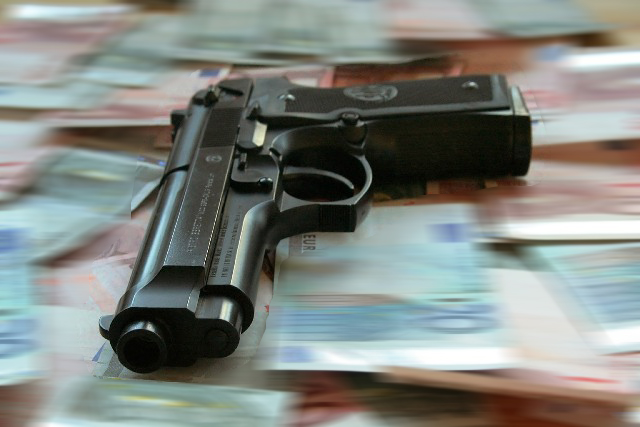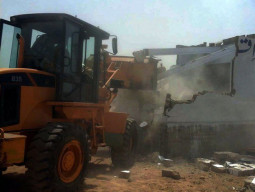
If you want to live in Qasimabad, you have to do one of two things — either keep money aside every month to pay extortionists or build political connections to ward off criminals.
“There are only two ways you can do business in this town,” the elderly Rasool Bux Shaikh, the president of the traders’ association of Qasimabad, said forthrightly. “Either you pay bhatta [extortion money] or you have good connections with the politicians.”
Speaking with his frail voice at his sanitary fittings shop on Qasimabad Road, the town’s main market, he groaned that, “the bad thing even if you give bhatta is that there are dozens of groups and political parties that you have to pander.”
The crime in Qasimabad can be classified in three separate categories: extortion, street crimes and robberies. Kidnappings, which do take place, occur only sporadically and the town is no match for the City taluka and other parts of the district when it comes to gambling and prostitution dens. Luckily, the killings against extortion have hardly ever taken place but there have been instances when traders have had to wind up their businesses.

Extortion
Although the town’s limited land does not provide room for industrialisation, it holds promising returns for other commercial activities and real estate development. This is mainly thanks to the higher proportion of middle- to rich-class residents from across Sindh, who have made Qasimabad their home due to better health, education and civic facilities.
“There are palace-like houses of about two dozen MNAs, MPAs and senators in Qasimabad in addition to scores of bureaucrats and feudal lords,” said nationalist leader Ayaz Palijo, the president of Qaumi Awami Tehreek. “Despite this fact, the town has been left at the mercy of extortionists, robbers and thieves.”
The targets for the extortionists are the developers, shopkeepers and those managing delivery vans. Whatever money these traders lose to extortionists, they pass them down to the people - the rates of fruits, vegetables, meat and other edible commodities are higher in Qasimabad than other areas. “The sellers fix prices only as high as to make sure people don’t travel to other markets that are further away,” explained a resident of Naseem Nagar, Iftikhar Samo.

According to Danish Memon, who runs one of the oldest departmental stores in the town, not all the shopkeepers pay extortion. But, most of the delivery vans that are mostly owned by City- and Latiafabad-based commodity dealers, cannot evade this. “Often goods don’t reach our stores and we have to go to the dealers to get them. This obviously causes an inevitable price differential.”
The present state of affairs has made Qasimabad an exclusive domain for mainly Sindhi investors. “There is a pool of well-heeled and savvy traders among the Urdu-speaking, Bohri, Khwaja and to some extent Pakhtun communities in downtown Hyderabad,” pointed out a Bohrti trader, who wished to stay anonymous. “There is money to burn but these investors are repelled by the circumstances prevailing there [in Qasimabad].” He claimed that a few Bohri traders, who have their construction material and home decor shops in Faraz Centre on Wadu Wah Road, pay ‘protection money’ to an influential nationalist leader.
Police stations
There are three police stations in Qasimabad taluka. One of these stations, Qasimabad, is situated in a rented house while Nasim Nagar police station is functioning in a single-room structure, which used to be a police post before its elevation to a police station. Moreover, two of these stations do not have police vans. Dr Ahmed told The Express Tribune that the crime record at these stations is also haphazard but they have started compiling the data from the year 2000 till now.
“Recently, the Hyderabad DIG managed to get an approval for sub-divisional police officers for all four police subdivisions in the district. Yet, he couldn’t find one for Qasimabad,” an official told The Express Tribune, pointing to the complicated state of affairs, also encompassing the nationalist elements and criminals among poor migrants, in the town.
The police officials suggested that, in view of the special status of Qasimabad, the diversity of its inhabitants and the concentration of influential persons, the Sindh IGP should declare Qasimabad a model sub-division for policing.
Property value
The case with real estate in no different. The town’s property value has increased by leaps and bounds over the last decade. A 400-square-yard residential plot in Qasimabad Phase I costs around Rs15 million, according estate agent Ghulam Nabi Khoso. A 10-by-30 feet medium-sized shop on Qasimabad road starts from Rs3 million. Some of the cooperative housing societies in the town are still more expensive.
For Khoso, the town has been seeing more horizontal growth of residential units. But, of late, vertical growth has been picking up with hundreds of multi-storey residential-cum-commercial building projects already completed and inhabited while many others are either in progress or being planned, he added. “The investment of non-native Sindhis is the lifeline of the town’s property boom. But, sadly, there are factors that are keeping prices artificially high.”
One of the factors that Khoso referred to without naming is extortion. “The new builders first have to find out which party wields more influence in the area he intends to invest in so that things can be worked out smoothly,” he explained. “If a developer is not wise enough to do this, the problems will only grow for them,” commented an official, who works for one of the two top builders in Qasimabad - Abdullah Builders and Arif Builders. According to him, one of these builders pays protection money to a nationalist party while another is connected with the party that has been in the government.

Street crimes and robberies
Qasimabad is not an exception in the district as far as street crimes and robberies are concerned. But the incidents happen with comparable frequency. The Bhittai Nagar police station, one of the three police stations in Qasimabad, registered around 40 FIRs of robbery, dacoity and vehicle snatching between January and September this year, The Express Tribune learned. However, political workers, called comrades in local slang, are rarely seen involved in such crimes. The miscreants are either poor migrants or small local groups of felons. “These elements find easy shelter in poor neighbourhoods on Qasimabad’s fringes,” elaborated Punhal Saryo, a nationalist leader who now heads a non-profit Sindh Hari Porhiyat [peasant labour] Council. “As most of them are not local, they escape to their hometowns after committing a crime.”
To cope with this problem, Hyderabad police chief SSP Fida Hussain Mastoi has adopted a strategy of ‘flushing out’ the criminals. “I want to make certain that either the criminal elements are arrested or we instil so much fear in them that they run away from this city.” With his 2,860-strong police force, one-third of the required strength of around 9,500 personnel in the district, Mastoi is on a rampage, combing area after area.
Traders in Qasimabad are breathing a sigh of relief after witnessing a drop in the crime rates. The extortion complaints have also reduced due to police action, according to the traders’ association president. “The traders have met the nationalist and political leaders time and again over the years but our concerns don’t get a long term solution,” said Shaikh. Meanwhile, Ayaz Palijo and Punhal Saryo have started separate campaigns to mobilise the traders and the community against the criminals. Palijo went out to the shopkeepers in Qasimabad urging them to stop paying extortion. He asked them to report every incident. “Qasimabad is mini-Sindh. If we can improve the quality of life here, the town’s residents will then carry Qasimabad’s characteristic features to the cities of their origin,” hoped Pakistan Muslim League - Nawaz leader Ayub Shar.
Meanwhile, the police are not very hopeful. “There is a concentration of big guns in Qasimabad,” said Headquarters ASP Dr Fahad Ahmed, who also has the acting charge of Qasimabad SDPO. “This elite class from entire Sindh also makes policing difficult in Qasimabad.” According to Dr Ahmed, more than 50 parliamentarians and hundreds of senior officials from police, district management and other powerful government departments have their homes here. The ASP pointed out that a large number of private cars moving in the town flash blue lights. “If any policeman dares to stop one of these cars, he can face consequences ranging from a transfer to suspension besides insult.”
Over the last one and a half year, at least six kidnapped persons including the slain neurosurgeon Dr Aftab Qureshi, were kept in deluxe residential colonies in Qasimabad. Another doctor, Murli Das, was also kidnapped and recovered from a bungalow in this town last month. “The police face strong backlash if they mistakenly raid a wrong house on a tip-off.”
‘Qasimabad — it’s mini Sindh’
Qasimabad — popularly known as mini Sindh — earned this name for the diversity of its inhabitants.
A majority of the town’s over 400,000 residents are non-native Hyderabad citizens, hailing from the province’s other 21 districts, excluding Karachi. Together they embody the distinct variants of Sindhi civilisation, language and culture in a town that is also the hub of Sindhi nationalist politics, literary activities and an assertive civil society.
Qasimabad was planned in the 1980s on the agricultural lands and villages located between old Hyderabad and the left bank of river Indus. The ethnic riots of 1988 and 1989, in which Sindhis moved out of Hyderabad’s City and Latifabad talukas, set the ball of population surge rolling.
The arrival of inter-provincial Sindhi migrants synchronised with those cataclysmic events. But, with the passage of time the habitation of the latter group outpaced the former. The trend continues to this day and the taluka’s population build-up is higher than the rest of the three talukas. However, over a period of time ramifications of this dramatic growth and political expediencies have led to rising street crimes, robberies and extortion.
Published in The Express Tribune, October 27th, 2013.
COMMENTS (1)
Comments are moderated and generally will be posted if they are on-topic and not abusive.
For more information, please see our Comments FAQ



1732259077-0/carti-(1)1732259077-0-165x106.webp)













Qasmabad is a PPP stronghold.. enough said all these extortion problem seems to be comming from PPP stronghold areas.